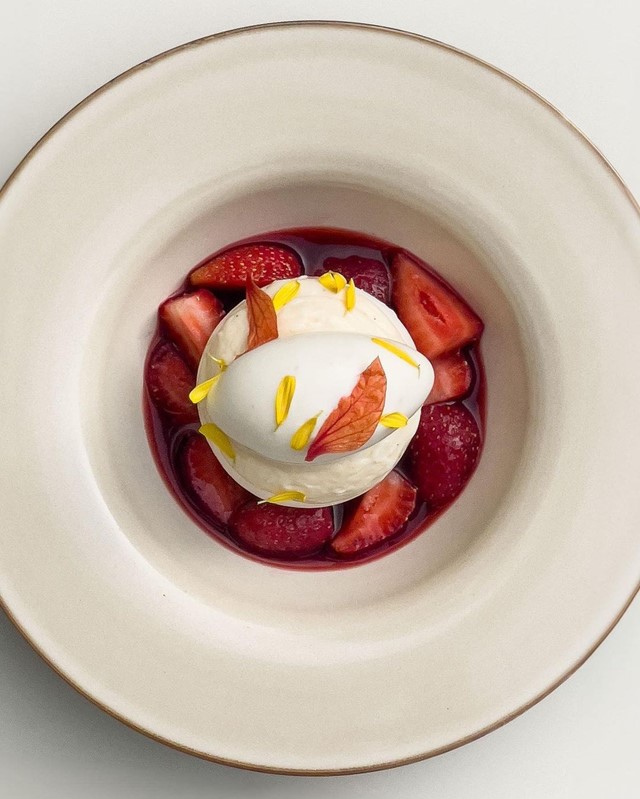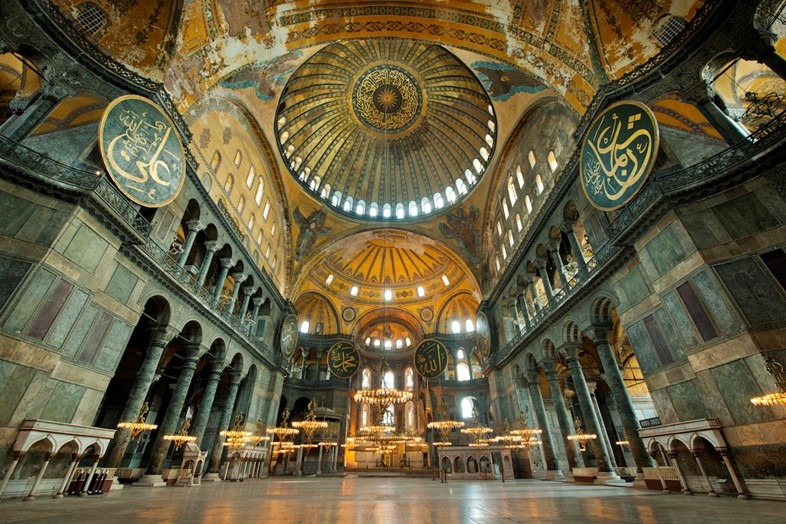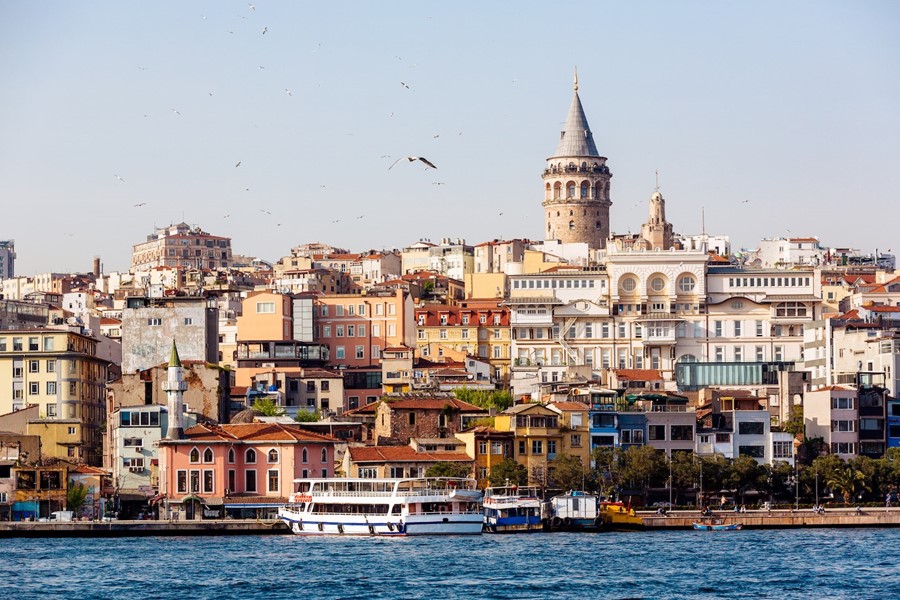Benji and Lamia Al Otaishan Aydin of fashion brand Les Benjamins curate a list of must-see galleries, restaurants and cultural hotspots in the city they call home
You’d be hard-pressed to find a city with such a profound yet harmonious divide as Istanbul. The capital city of Turkey is where Europe meets Asia, Byzantine meets metropolis, and old-school artistry meets new-school innovation. It’s also the place that Les Benjamins’ founder Bünyamin Aydın (AKA Benji) and his wife, Lamia Al Otaishan Aydin, the womenswear design director of his label, call home – and like many other creatives living in the area, it’s where they source inspiration for the sensitively complex clothing they design. “Once you reconnect with your roots and the origins of how music genres started in your hometown, only then can you continue building new movements,” says Benji. “I want to reintroduce these Turkish cultural treasures to the youth.”
Their Autumn/Winter 2024 collection – Eastern Punk – continues the narrative of the east versus west culture clash. Weaving together identities, Les Benjamins’ mostly genderless collection delves into the ancestral roots of Turkish punk, which is rendered in ornate patterns, an eclectic and tantalising colour palette, and adorned with the codes of rebellion in zippers, pins, distressed denims and patchworking. Trompe l’oeil is applied to vibrant denim, making it appear like leather, while tailoring is slouchy and effortless. The outcome is any rebel’s dream, capturing the zeitgeist of anarchy and unrest in youth culture.
The label began in 2011, two years after Benji’s father passed away. “He was a carpet and rug collector,” he remembers. “Initially I wanted to start a jewellery brand, and I went to the Grand Bazaar in Istanbul to see the craftsmen at work. I saw how men were carrying these huge rugs in the weirdest ways. It hit me, there in the Grand Bazaar, and I reconnected with my father’s rug collection, and I put them as the central DNA of a fashion brand.” In the new collection, rug prints lifted directly from that collection find their way as prints on jackets, and the motif ‘don’t step on my rug’ is emblazoned onto various pieces. Benji’s sentimental ode to the city feels palpable through each thread.
Benji and Lamia make for enthusiastic narrators. They speak in the candlelit bar of Soho House Istanbul, a stone’s throw away from the location they’d just shown their collection to a select number of press. Despite being key architects of the fashion scene in the surrounding area, they are humble; in conversation, their vivid imaginations, instincts and optimism are clear, as they volley over nuggets of inspiration, appearing as passionate about their community of rebels as they are about the clothes that dress them. “This collection is definitely rebellious, and it’s angry,” says Benji. “But anger feeds creativity.”
Punk is as moodboard-ready as it gets, yet for Benji and Lamia, it feels more important to be anarchic now than ever. “Part of being punk is speaking about things that are wrong and being political,” says Lamia. “I’m angry and sad about what’s happening in the world right now. As creatives, we get affected by everything that’s happening in the world, and people being complacent to injustice – that makes me angry.” Choosing punk as a standpoint is not a departure, but more an extension of their ethos. Grounded in today, casual athleticwear reigns supreme, yet it’s easy to forget the aesthetic of punk began in the streets, too. “What kind of brand are we? Are we street, avante-garde?” reflects Benji. “Are we advanced contemporary, are we a designer brand? I don’t know. It’s changing. The world keeps changing.”

Les Benjamins merely wishes to both reflect, respond to and advance the voices and wardrobes of the street, as made evident in their collaborations with lesser-known Turkish talent. With an ear to the ground, their work is indebted to some of Istanbul’s fêted surroundings. The city’s top sights are the stuff of legend, with an eclectic jigsaw of diverse neighbourhoods, dense with architectural highlights, more than a staggering 3,000 mosques built on its street corners, delicious food and exciting watering holes. “Hospitality is part of our culture,” Benji says with a smile.
Below, Benji and Lamia Al Otaishan Aydin curate a list of places any creative visiting Istanbul should visit.
Arkestra
Situated in the chic neighbourhood of Etiler (which is, as it happens, next door to Les Benjamins’ headquarters), this Michelin Guide restaurant is a marvellously designed hotspot for the area’s creative scene. Residing in a former 1960s residential villa, the restaurant arrived in September 2022, quickly making a name for itself thanks to chef patron Cenk Debensason’s genre-defying cooking, which combines local seasonal ingredients with French techniques. Be sure to try the tuna sashimi with sushi rice ice cream – a surprising combination that’s as bold as it is refreshing.
For fine dining, Benji and Lamia also recommend: Fatih Tutak and Neolokal.

Grand Bazaar
A shopping haven in the heart of the city, the Grand Bazaar has been a treasure trove of markets since it was established in the 15th century. The bustling labyrinthine destination includes intricately woven carpets, some dazzling gold jewellery, ornate ceramics, rich textiles, chocolates and piles of exotic spices, sold by lively and friendly merchants clamouring for your attention. Stroll through its meandering alleys and immerse yourself in the authentic atmosphere, as artisans skillfully craft their wares and shopkeepers proudly showcase their diverse offerings.
Ambidexter
Founded in 2016 by Ulaş Parkan, Ambidexter is a non-profit art gallery that aims to empower and develop Istanbul’s burgeoning artists. Aiming to make a space where artists retain ownership over their art – all profits go towards funding the gallery’s future – Ambidexter rejects the capitalist art ecosystem, saluting artists that match their radical ethos. Their current exhibition, Fantasia 23, is a joint show by young local artists Selver Yıldırım and Oğulcan Kuş, a must-see before it closes on March 4.
For art galleries, Benji and Lamia also recommend: Pilevneli.

Hagia Sophia
This take-your-breath-away architectural masterpiece has witnessed the ebb and flow of civilisations since its construction in the 6th century. Originally built as a cathedral, Hagia Sophia later served as an imperial mosque before being transformed into a museum in the 20th century and then back again to a mosque in 2020. Marvel at the seamless blend of Byzantine and Ottoman influences as you explore its vast interior, where ancient serenity meets the vibrant energy of modern Istanbul. The Hagia Sophia stands not only as a testament to the city’s rich heritage, but also as a symbol of its enduring and evolving cultural significance.
Bi Nevi Deli
For vegan and organic eating in Istanbul, creative plant-based kitchen Bi Nevi Deli has been developing and serving dishes using predominantly in-season ingredients from organic and local purveyors since 2014. It’s not in the restaurant’s ethos to avoid meat and dairy substitutes altogether – instead, the Bi Nevi Deli aims to offer plant-based proteins and nut-based cheeses developed by their San Francisco-born head chef, founder and qualified nutritionist Belkis Boyacigiller, with an eye on health as much as flavour.
Saloncuma
In the heart of Istanbul’s Çukurcuma district, decked with original 1920s interiors, this dinner and wine bar is a rarity that provides brilliant food and wine in a homely atmosphere, set out over a labyrinthine first-floor historical apartment, a stone’s throw from novelist Orhan Pamuk’s Museum of Innocence. Sometimes acting as a venue for hire – the location has hosted film premieres and new music releases from Istanbul’s most exceptional talent – the space is open to the public from Thursday to Saturday, with a superb menu of local delicacies.
For local favourites, Benji and Lamia also recommend: Araka, Amanda Bravo, Yeni Lokanta, and Itsumi.
316 Wine Bar
Borrowing its name from a low-carbon form of stainless steel scrap, 316 Wine Bar is a trendy low-waste venue within the city’s upscale Nişantaşı quarter. Turkey has long been producing brilliant wines throughout a number of its rural regions, but given the conservative government’s attitude towards alcohol, many of the grapes are sadly not turned into wine – yet winemaking in Anatolia is said to date back to 7,000 years. Despite its smaller, unassuming venue, the wine bar is assuredly a hidden gem, with plenty of Turkish winetasting evenings hosted by the region’s greatest sommeliers.
For bars, Benji and Lamia also recommend: Arkestra Listening Room, and Tavern.






